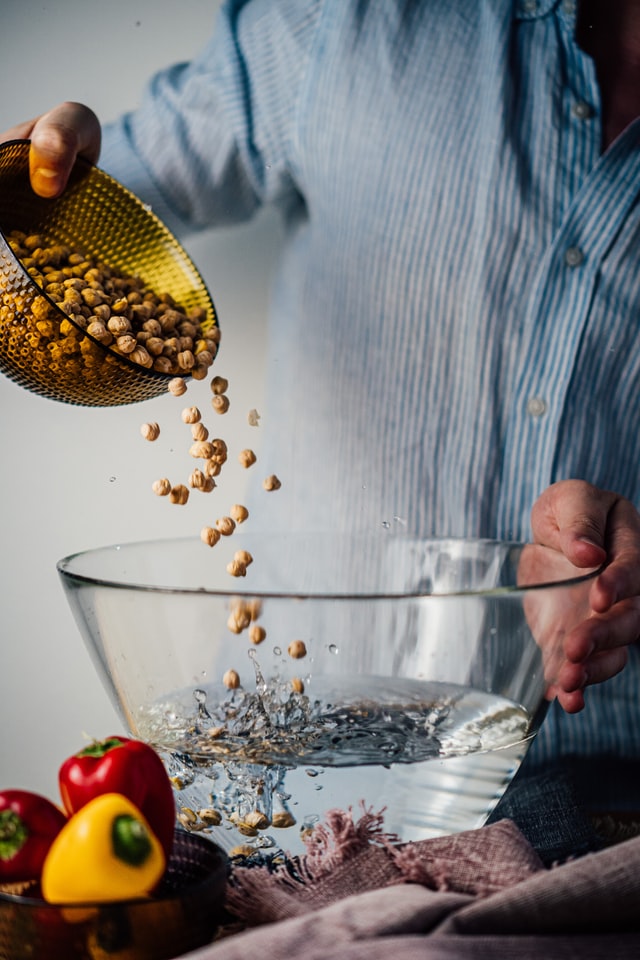


With the New Year here and new COVID-19 variants popping up, taking care of our health should be of the utmost importance. Whether you’re looking for a reset, want to support your immunity, or are concerned with longevity, exploring foods and dietary habits that will help us do so are critical. The idea of eating like people who are living proof of longevity isn’t novel. The findings of Blue Zone founder Dan Buettner fall in line with advice from world-leading longevity scientists like Elizabeth Blackburn, Ph.D.; Valter Longo, Ph.D.; and David Sinclair, Ph.D. In short, eating more fruits, vegetables, whole grains, nuts, seeds, and quality sources of omega-3s from fish, algae, nuts or seeds while minimizing meat, dairy, eggs, and refined carbohydrates will not only improve your chances of living more years in good health but will likely add more years to your lifespan. Now, who doesn’t want that? Let’s dig into the science, shall we?
1. Fruits and Vegetables:
We all know that eating an array of fruits and vegetables is integral for our health. But does it help with longevity? A recent meta-analysis of 95 cohorts from around the world found that for every 7-ounce (200-gram) increase of fruits and vegetables per day, participants gained a 10 percent lower risk of premature death. Not only do we get to focus on consuming incredibly delicious foods, but we gain years back to our health by doing so. Well, the good news doesn’t stop there. Maximum benefits were seen at 28-ounces per day (800-grams), a 31 percent lower risk of premature death. With an emphasis on apples, berries, pears, citrus fruits, cruciferous vegetables, leafy greens, and potatoes. So if you’re looking for a simple way to increase your longevity, start increasing your amount of fruits and vegetables.
2. Dietary Fiber:
Dietary fiber is associated with so many more things than bulking up your stools. It has a connection to your immune system, promotes a healthy body weight, and can actually help us live longer and healthier lives. In 2014, a meta-analysis including over 1.7 million participants showed that for every 10-gram increase in fiber per day, the risk of premature death was lowered by 11 percent. Given that roughly 5 percent of the American population reaches the suggested daily target for dietary fiber (25-38 grams per day), it’s not surprising that the average American only consumes about 16 grams of fiber per day. All of which makes for a tremendous opportunity to make changes in our diet that will help us live longer in a very feasible way. Focus on incorporating whole plant foods like fruits, vegetables, whole grains, and legumes to increase fiber intake.
3. Legumes:
There are so many fascinating benefits of consuming legumes. From their nutritional benefits and accessibility, they are a win-win. Just by consuming more legumes, it will automatically boost the amount of plant protein and fiber in your diet. Which we know, in turn, improves your chances of living a longer, healthier life. Studies have shown that for every 20-grams of legumes a day, you could decrease your risk of premature death by 7 to 8 percent. With 20-grams being such an incredibly small amount, this is such an easy way to maximize the quality of your diet and life. Some of our favorite legumes are lentils, chickpeas, black beans, and soybeans.
4. Nuts and Seeds:
There is an exorbitant amount of well-documented research showing that nut and seed consumption is associated with living a longer life. Nuts and seeds are filled with heart-healthy polyunsaturated fats, fiber, micronutrients, and phytonutrients. Despite nuts being known for their calorie-density, they are indeed associated with healthy body weight, decreased risk of chronic disease, and ultimately, a longer life. At this point, you may be wondering how many servings per day are we talking about? One study with over 120,000 participants followed for over two decades identified that compared with participants not eating nuts, those consuming seven or more 28-gram servings per week had a 20 percent lower risk of premature death. Walnuts, in particular, have impressive benefits and are associated with brain health.
5. Whole Grains:
Regular consumption of whole grains is linked to a reduction of cardiovascular disease, diabetes, cancer mortality, and an overall reduction in premature death. Furthermore, for every three servings (around 30-grams) of whole grains such as oats, brown rice, rye, buckwheat, and wild rice were shown by a large meta-analysis of 11 observational studies to reduce the risk of premature death by 17 percent. This effect was observed up to a total of around seven servings per day. Given that Americans consume about 85 percent of their grains from processed, or refined sources, making this swap will have a tremendous benefit to our health.
Related Stories:
Prebiotics Versus Probiotics: Do You Need Both For A Healthy Gut?
Are You Eating For Brain Health? Take A Look At These 7 Vital Foods
科学的に証明された、長生きに効果的な5つの食品
新年がスタートし、COVID-19の亜種が出現している中、健康に気を配ることは引き続き最も重要な事柄です。カラダのリセットをしたい場合でも、免疫力をサポートしたい場合でも、長寿に関心がある場合でも、役立つ食べ物や食生活を探求することが重要です。長寿を証明している人々のように食べる、という考えは目新しいものではありません。ブルーゾーンの創設者であるダン・ベットナーの調査結果は、エリザベス・ブラックバーン博士のような世界をリードする長寿科学者からのアドバイスと一致しています。ヴァーテル・ロンゴ博士やデビッド・シンクレア博士は、要するに、魚、藻類、魚などから摂取できるオメガ3オイル、野菜、全粒穀物、ナッツ、種子、および高品質の供給源をより多く食べることを推奨しています。肉、乳製品、卵、精製された炭水化物を最小限に抑えながら、健康であり続ける可能性を高めるだけでなく、あなたの寿命をさらに長くする可能性があります。さて、誰がそれを望まないと思うでしょうか?科学を掘り下げてみましょう。
1.果物と野菜:
たくさんの果物や野菜を食べることが私たちの健康に不可欠であることは、私たちは皆知っています。 しかし、それは長寿に役立つでしょうか? 最近のメタアナリシスでは、1日あたり果物と野菜が7オンス(200グラム)増えるごとに、早死のリスクが10%低くなることがわかりました。 私たちは信じられないほどおいしい食べ物を食べることに集中するだけでなく、そうすることで何年も健康でいることができます。 最大の効果は1日あたり28オンス(800グラム)で見られ、早死のリスクは31%低くなりました。 リンゴ、ベリー、ナシ、柑橘系の果物、アブラナ科の野菜、葉物野菜、ジャガイモに重点を置いています。したがって、寿命を延ばす簡単な方法を探している場合は、まずは果物や野菜の量を増やし始めてください。
2.食物繊維:
食物繊維は、さらに多くのものと関連しています。それはあなたの免疫システムと関係があり、健康的な体重を促進し、実際に私たちがより長くより健康的な生活を送ることを助けます。 2014年、170万人を超える参加者を含むメタ分析では、1日あたり食物繊維が10グラム増えるごとに、早死のリスクが11%低下することが示されました。アメリカの人口の約5%が、一日あたりの食物繊推奨量(1日あたり25〜38グラム)に達していることを考えると、平均的なアメリカ人が1日あたり約16グラムの繊維しか消費しないことは驚くべきことではありません。これらすべてが、私たちの食生活を変える絶好の機会となり、非常に実現可能な方法で長生きに役立ちます。果物、野菜、全粒穀物、豆類などの植物性食品全体を取り入れて、食物繊維の摂取量を増やすことに焦点を当てます。
3.マメ科植物:
マメ科植物を消費することには非常に多くの魅力的な利点があります。 それらの栄養上の利点とアクセス可能性から、それらは双方にメリットがあります。 より多くのマメ科植物を消費するだけで、それはあなたの食事中の植物性タンパク質と、食物繊維の量を自動的に増やします。 私たちが知っていることは、順番に、より長く、より健康的な生活を送る可能性を高めます。 研究によると、1日20グラムのマメ科植物ごとに、早死のリスクを7〜8パーセント減らすことができます。 20グラムは非常に少量であるため、これはあなたの食事と生活の質を最大化するための非常に簡単な方法です。 私のお気に入りのマメ科植物のいくつかは、レンズ豆、ひよこ豆、黒豆、大豆です。
4.ナッツと種子:
ナッツと種子の消費が長寿に関連していることを示す、膨大な量の研究があります。ナッツと種子は、健康的な多価不飽和脂肪、繊維、希少栄養素、および植物栄養素で満たされています。ナッツはカロリーが高いことで知られていますが、実際には健康的な体重、慢性疾患のリスクの低下、そして最終的には長寿に関連しています。この時点で、1日あたり何サービングが適量か疑問に思われているかもしれません。 20年以上にわたって12万人以上の参加者を対象としたある研究では、ナッツを食べていない参加者と比較して、週に7回以上28グラムのナッツを消費する参加者は早死のリスクが20%低いことが確認されました。特にクルミには印象的な利点があり、脳の健康に関連しています。
5.全粒穀物:
全粒穀物の定期的な摂取は、心血管疾患、糖尿病、癌による死亡率の減少、および早死の全体的な減少に関連しています。 さらに、オーツ麦、玄米、ライ麦、そば、ワイルドライスなどの全粒穀物約30グラムごとに、11の観察研究の大規模なメタ分析によって、早死のリスクを17%まで減らすことが示されました。この効果は、1日あたり合計約70gまで観察されました。アメリカ人が穀物の約85%を加工または精製された供給源から消費していることを考えると、この改革を行うことは私たちの健康に多大な利益をもたらすと考えられます。
関連記事:
プレバイオティクスとプロバイオティクス。健康な腸には両方が必要ですか?
あなたは脳の健康のために食事をえらんでいますか? これらの7つの重要な食品をチェックしてください